Today I want to share with you the beginning of a new stage in my life.
It started last year when I decided to apply for a Fulbright research scholarship. My proposal: to conduct an anthropological study of Syrian cuisine; specifically, lunch. My perspective is slightly biased since both sides of my family are originally Syrian, but I believe Syrian food is among the best in the region. This is particularly true in Aleppo — Syria’s second largest city and headquarters for the Syrian Academy of Gastronomy.
The title of my proposal was “Between Us, Bread and Salt.” This is a literal translation of an old Arabic proverb, بيناتنا خبز و ملح (baynaatna khobz w milah). I like what this proverb stands for and thought it made sense in the context of my research. Food brings people together. I chose to focus on lunch because it’s usually the biggest and most important meal of the day in Syria and most Mediterranean countries. Lunch is when friends and family get together to eat, laugh, and share everyday stories. I proposed to study lunch from three different perspectives: restaurant meals, home cooked meals, and street foods.
Now, fast forward about ten months. Ten very long months. In my mailbox one afternoon, I found a yellow, letter-sized envelope from the Institute of International Education. I knew what was inside. I immediately grabbed the phone to call my grandmother. I knew that regardless of the outcome, my sito would know the right things to say; she always does. I called her house and let her know I had the envelope in my hands. I was both nervous and eager; this was the moment I had been waiting for. I carefully ripped the corner of the envelope and slid my index finger along the seal, making sure not to tear the letter. That’s when I took a deep breath and closed my eyes. I remember hearing my grandmother whisper a short prayer under her breath. I pinched the paper, and slowly pulled it out from the envelope. With my eyes barely open, I squinted and caught a glimpse of the phrase, “I am pleased to congratulate you.”
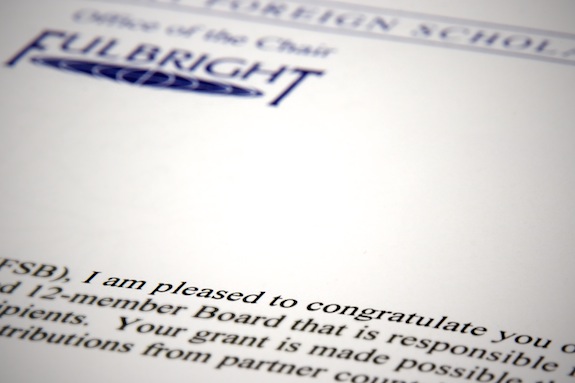
Even as I write this post today, it hasn’t sunken in yet. In a little over four weeks I need to be packed and ready to move to Syria for nine months to study food. I will be working with renowned Syrian food expert, Samir Tahhan (no relation) as well as members from the Syrian Academy of Gastronomy. I’m humbled. I owe a huge part of this amazing feeling to you, all the readers, who have encouraged me to continue blogging and pursue my dreams. Thank you, thank you, thank you!
I will try and write a couple more posts with more details before I start my Fulbright, but for now, I need to tell you about this pretty fantastic kabab recipe before summer slips away. It’s an Aleppan specialty. It’s called kabab banjan, or eggplant kababs.
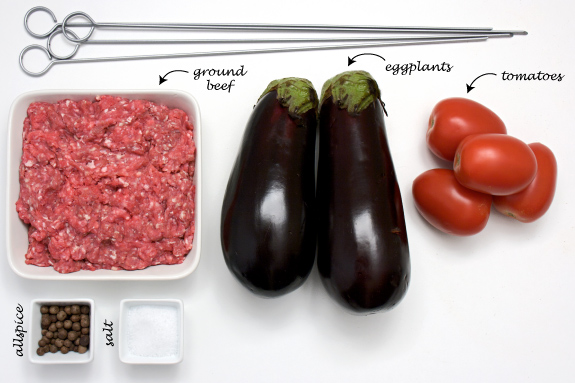
I love recipes like this because they cannot get any simpler. Only three main ingredients. Before summer is over please promise me you’ll try this recipe, only because I promise you will fall in love with it (if you like eggplants, that is).
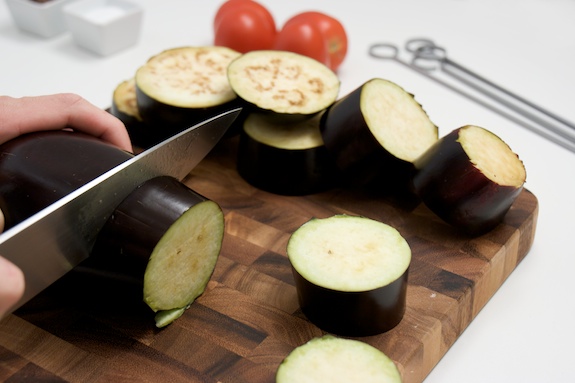
You’ll want thick slices of eggplant because of all the water they’ll lose. This will help the eggplant maintain their shape.
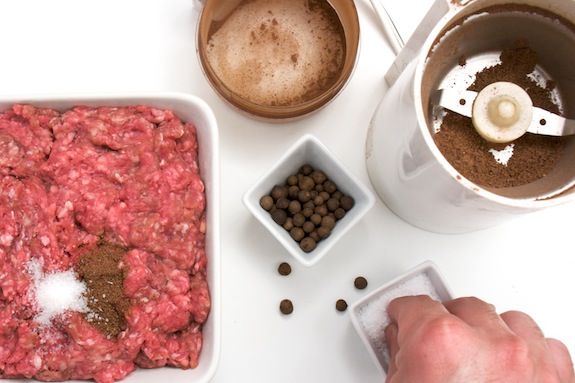
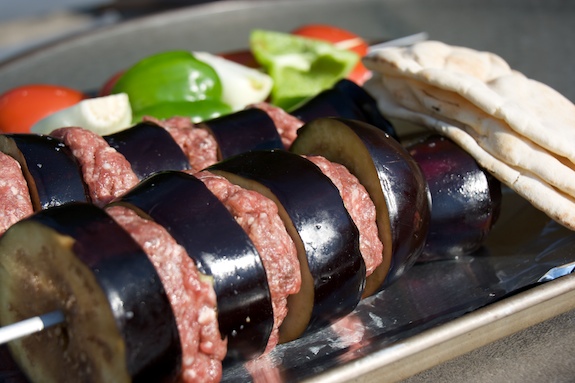
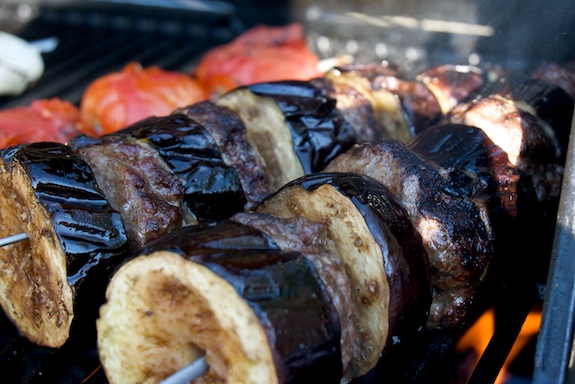
This is precisely the reason you want to be doing this outside, over an open flame. You just can’t develop a crust like this on a skillet. You can get a sear, sure, but the best flavor comes from the scorching flames directly underneath the kababs. That’s how the magic happens. You’ll start to hear a soft crackling sound while fat from the meat melts into the fire — that’s a good thing. The juices from the meat will also start to seep into the eggplants and your entire grilling area will start to smell like a huge plate of baba ganoush. It’s a wonderful experience.

Aha! The secret. This dish, like most good dishes, comes with a secret. The original idea to make this dish came from a reader who wrote me an email asking why her recipe for kabab banjan does not have a pronounced eggplant flavor. I consulted with my grandmother, of course, and wrote back. After you’ve developed a good crust on the eggplant and meat skewers, you want to place the kababs in an oven-safe receptacle, pour a thin layer of water, cover with aluminum foil, and bake at 350 degrees for 20-30 minutes. This gives time for the eggplant to finish cooking all the way through, and at the same time allows the meat to soak up more of the roasted eggplant flavor. This is also the perfect time to prepare a side of rice and set the table.
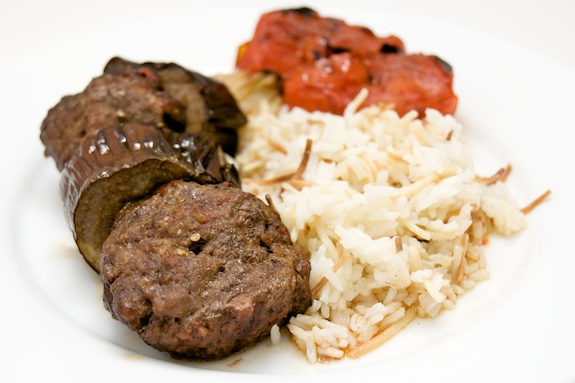
Enjoy what’s left of the summer — صحة و هنا (saha w hana) bon appetit!
Kabab Banjan
yields 6 servings
Components
- 1/2 kg 80-85% ground beef or lamb
- 4 medium eggplants
- salt, to taste
- allspice, to taste
- 8-10 skewers, preferably metal
- roma tomatoes
- pita bread
Putting them all together
- If you’re using wooden skewers, start by soaking them in water as directed by package.
- Rinse and dry the eggplants.
- Remove the tip of the eggplants, then slice into thick, even slices (approx 1.5in. thick).
- Season the eggplant with salt and a drizzle of olive oil.
- Season the ground beef with salt and allspice (freshly ground, if possible).
- Divide the meat into even patties, approximately the same diameter as the slices of eggplant.
- Alternate between eggplant and meat patties on the skewers. If there is any leftover meat or eggplant, you can skewer it by itself.
- Skewer whole roma tomatoes.
- Cook the eggplant-kabab skewers over a hot grill until you get an even char on all sides.
- Roast all the tomato skewers until they are evenly charred as well.
- In a large oven-proof container, pile all the eggplant-kababs and top with the roasted tomatoes. Add between a 1/4 and 1/3 cup of water to the pan — you want to make sure there is a thin layer of water covering the bottom of the pan.
- Cover loosely with aluminum foil and bake in a 350 degree oven for 20-30 minutes.
- Serve with rice or pita bread and enjoy.
I want to dedicate this post to everyone who helped and guided me throughout the Fulbright application process. I could not have received this prestigious award without your generous support. Thank you:
Dr. Stefan Senders, Fulbright advisor, for your inspiration and for being a wonderful mentor. Mrs. Elizabeth Edmondson, coordinator of the Fulbright program at Cornell University, for your support, kindness, and delicious recipe for Jamaican Cock Soup. Dr. Jane Fajans, for exposing me to the field of food anthropology and advising me on my research. Dean Maria Davidis, for always encouraging me as an undergraduate and being there to talk food. Dr. June Nasrallah, faculty advisor for the Lebanese Club at Cornell, for supporting my culinary endeavors. Dr. Feryal Hijazi, professor of Arabic at Harvard University, for helping me improve my Arabic. I want to thank the Syrian Academy of Gastronomy for setting me up with a terrific mentor, Mr. Samir Tahhan, and offering me the resources to explore the best of Syrian cuisine. I also want to thank everyone at the Institute of International Education for making the Fulbright possible.
Thank you!
Congratulations on your Fulbright scholarship! That sounds fantastic;best of luck to your culinary journey in Syria.
Congrats bro. You not only deserve it but have earned it through your dedication to all those yummies you post during ungodly Ramadan hours 🙂
Keep it going and make sure to invite me on the mighty celebratory feast at the end of the road! 😀
Congratulations Tony! May you have a successful year and truly enjoy it! Keep us updated!
Congratulations! I can’t wait to read about all of your adventures in Syria!!
Fantastic news! What a great opportunity for you. I love your blog and hope you keep us informed of your adventures and findings during your stay in Syria.
I wonder is you will have the opportunity to meet Anissa Helou. I met her at Lake Austin Spa during one of her classes and was so impressed with her knowledge and style.
Good luck!
I just found your website. Congrats on the scholarship, You are gonna have such a great time!
That Kabab Batinjan looks so good, I have to make that soon.
This is awesome. I can’t wait to make it before my parents’ visit is over. Thanks a lot. And congrats on your scholarship. I hope you keep blogging through it. Best of luck!
Congrats Tony! Can’t wait to hear about all of your Syrian culinary adventures.
So very very proud of you, Tony. I hope you have a wonderful experience! And this recipe looks *incredible*. Mmm! 🙂 xo
Congratulations Tony! It’s going to be an exciting number of months for you!
And… I promise to try the kababs. Anything that smells like baba ganouj is worth making.
Congrats! I have to agree with you, Syrian cuisine is by far the best in the region and now you get to immerse yourself in it! I haven’t been following your blog for long so I don’t know if you have a cook book out but if you don’t… that has to be your next project! A collection of Syrian recipes the way they’re served in homes! You must have heard this suggested to you and now with this scholarship, its a great opportunity!
Good luck and looking forward to reading about your time in Syria 🙂
Way to go, Tony! How exciting. And i love the kabobs!
So happy for you. The committee made a great choice. I hope that you will continue to blog and send recipes. Best of luck.
Wow, congratulations! What an incredible opportunity and honor for you.
That recipe looks wonderful and I just went and took out some ground beef so I could make this tonight!
What a fantastic opportunity! Congrats, I have always heard about the wonderful food of Aleppo. Hoping you’ll have the chance to report every now and then. Very Cool!
CONGRATULATIONS!!!!break an egg!!!lol…i’m sure you will do extremely well
Tony,
I have really enjoyed your blog, hope you can continue while your away in Syria. This sounds like an amazing opportunity, so glad you went after your dreams.
congratulations tony..i think we all can feel it from the other end of the world..or laptop that is when i say that U GLOWED with awe and inspiration as the way u present ur blog..even the kebab banjan recipe.. just beautiful.. congratulations again tony. u deserve every bit of support u need to get where u are right now. smile and dont forget to massage that pretty face of urs bcs u’ve smiled too much! and yet again i say.. CONGRATULATIONS TONY!
oh yea.. if i dont have a griller.. can i just bake them in the oven?
Congrats to you!!
This is an amazing recipe. and thanks for sharing the secret.
Oh, congratulations, Tony! This is so exciting!
so nice to haeve found ur blog. congrats on ur opportunity. cant wait to see what u come up with! try to stop by beirut. u wont regret it 🙂
hi, i’m a fulbrighter going to korea next month and i came here through the weekly fulbright emails. i am definitely making this before I leave the us! good luck in syria and i am really excited to read more about your culinary adventures there. — lilian
Congratulations on the scholarship; I’m sure you’ll have a great time!
Thanks for the recipe – it’s very easy. Good tip with the post-grill baking.
Congratulations ! I also believe that Aleppan cuisine is the best of the region. Good luck !
Congratulations Tony! My mother recently told me about this , i was truly excited for you, i remember how enthusiastic you were about this, and thats great you got this oppurtunity, you really do deserve it! Im definately jealous of your adventure to halab to try out all the amazing food our families shall obviously shower you with lol! Good Luck! Have a great timeeee, and definately update the website with all the amazing foods you come upon, so maybe i can attempt to make them at home!lol
A little late, but CONGRATULATIONS! I am a Brown graduate going through fellowship applications right now to study food, so you are truly an inspiration. You are going to have such a wonderful time. As always, I love your site. Everything about it: photos, recipes, commentary–really wonderful. I continue to learn from it.
This is very late, I know, but congrats Tony! I used to lurk on your blog for hours, when I was in college and regret that I never left a comment to tell you how much I love reading your posts and gazing at your photographs.
I haven’t visited for months, life got in the way. Now, your news has jerked me out of the woodwork. I’m so glad you’re doing what you love. Keep us posted!
Hello Tony,
A friend of mind stumbled by your blog and forwarded to me as a piece of work (the blog/ you).
I’m a project planner and manager (in the cultural field), based in and originally from Damascus.
Please don’t hesitate to contact me once you come here for an interview, to get contacts to conduct your research or anything else you may need help with. I’ll do the best I can.
I’m a State Gov Alumnus (YES 03-04) and familiar with the Fulbright program.
If you need help before your come here, also please ask.
best, Maya
omg 🙂
this is one of my favorite foods 😀
tell me where did you take the pictures 😉
Hi Mohammad, I took the pictures in my kitchen 🙂 this is before I came to Syria though
Congratulations Tony. You’re an inspiration!
S
My dear Antonio,
So proud of you! I’m sure you are having a fantastic time in Syria. Look forward to hearing all about your journey this year.
I am definitely making this! Glad to come across your blogs. I am going to be a regular now congratulations (late I know)!
Antonio are you still in Syria? How did it go in Alepo? I know Aleppo is under some heavy fighting. If you are still in Syria I hope you are safe. Thank you for the post and the recipe.
Hi Rachel! I left Aleppo in April 2011, before it got bad. It’s heartbreaking to see what’s left of the city. This is a classic dish from Aleppo–it brings back lots of warm memories grilling with friends. Enjoy!
Tell me about it!! I have family in Aleppo. I have a big family in Syria. It is awful. I just cant believe it is happening. I know how much the Syrian people love their history and culture and how much they pride themselves on the love and respect for others. It is just terrible to see and hear of all the loss:(( Thank you for the recipe I plan to make it this weekend. I was in Syria the summer of 2009-2010. We booked for 2011 and had to cancel…:(